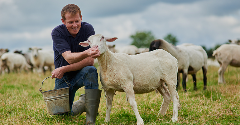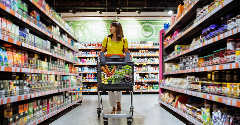News
FrieslandCampina Ingredients expands into animal-free dairy sector
19 Jan 2023A partnership between FrieslandCampina Ingredients and Triplebar Bio will bring animal-free dairy protein to market, a sustainable alternative to traditional dairy protein produced via precision fermentation.
To feed a growing global population and meet the rising demand for dairy proteins, manufacturers are exploring alternative sources and next generation methods of production such as cell-culturing, precision fermentation, and molecular farming.

Dutch ingredient supplier FrieslandCampina Ingredients recently revealed plans to develop and scale the production of cell-based protein via precision fermentation. The company will work in partnership with US-based biotechnology firm Triplebar Bio to produce bioactive dairy proteins that support human health and nutrition in early life and adulthood, it announced in a statement.
Precision fermentation could shape the future of dairy
Precision fermentation has surged in popularity in the global food industry in recent years. From February to May 2022, the term ‘precision fermentation’ experienced a 364% growth in total mentions on social and mass media compared to the previous year, evidencing the growing interest surrounding its use in food production.
Since 2016, FrieslandCampina Ingredients has experimented with precision fermentation, producing a range of ingredients from prebiotics to plant proteins targeting the cell nutrition, active and performance nutrition, early life nutrition, and medical nutrition markets. The company currently uses this processing technique to produce human milk oligosaccharides (HMOs), non-digestible carbohydrates present in human milk that play a key role in supporting infant health, the gut microbiome, and the brain development of new-borns.
The new partnership will see Triplebar and FrieslandCampina develop bioactive protein ingredients for the food, nutrition, and healthcare markets via a process of precision fermentation that uses proteins sourced from human or bovine milk. Combining a proprietary screening platform with advanced artificial intelligence and machine learning technology, the companies have collaborated to develop a platform to collect masses of biological data on the design and function of the organism, which is then used to optimise the protein production process.
“A core challenge we’re focussing on is creating recombinant proteins that have similar nutritional profiled to their equivalents in nature. Demonstrating the similarities will also be important in the regulatory phase,” said Anne Peter Lindeboom, managing director innovation at FrieslandCampina.
Currently in the development stage, the company is preparing registrations for FDA and EFSA novel food approval, which will be required before the ingredients can be launched to market. In line with its existing routes to market, FrieslandCampina will target the global adult and early life nutrition sectors.
“We are committed to providing high-quality solutions for people with special nutritional needs. We will be producing ingredients suitable for the highly regulated infant nutrition market as well as medical, active and performance nutrition for adults,” Lindeboom said.
Several other food brands including California-based biotech startup Perfect Day and Israeli multi-national manufacturer Remilk are already using methods of precision fermentation to produce functional dairy proteins such as whey and beta-lactoglobulin, which can replace traditional dairy products and ingredients, without compromising taste and texture.
A sustainable and scalable solution to traditional dairy production
Dairy, including commodities such as milk, cheese, butter, and yoghurt, is consumed by more than 6 billion people worldwide and from 2005 to 2015, underwent a 30% increase in production. As the global population continues to grow, the demand for dairy products is expected to rise, according to the World Wide Fund for Nature (WWF).
 © AdobeStock/agnormark
© AdobeStock/agnormark
Responsible for almost 3% of human-induced greenhouse gas emissions globally, research shows that traditional dairy production is both unsustainable and harmful to the environment. Dairy produced via next generation production methods such as precision fermentation requires less land and water use than products produced via traditional, agricultural methods, thus lowering the environmental footprint of such products.
Compared to whey protein found in traditional milk, alternative dairy formulations such as those produced by Perfect Day and Remilk, can reduce greenhouse gas emissions by up to 97%, water usage by as much as 99% and energy from non-renewable sources by 60%, research conducted by the brands shows.
“We need to leverage science and technology to make high-quality food affordably and sustainably. Biotechnology can reduce pressure on traditional food production systems while making the food system more robust and boosting nutrition for everyone, from babies to adults,” said Maria Cho, CEO of Triplebar.
Related news

California companies required to disclose heavy metal content in baby food
10 Jan 2025
As of January 2025, baby food manufacturers selling in California must disclose test results for four heavy metals – arsenic, lead, cadmium, and mercury – via an on-pack QR code.
Read more
Snack trends, ingredient claims, and plant-based perceptions: Highlights from Fi Europe 2023, part 1
7 Dec 2023
Value-led snacking, sustainability storytelling, and the importance of having a ‘star ingredient’: we asked consumer analysts and market experts at Fi Europe about the trends and innovations that are shaping the food industry.
Read more
Confirmed: California bans four ‘toxic’ food additives
10 Oct 2023
Four food additives, including the colouring Red No. 3, will be banned in food in the US state of California over safety concerns, with public health campaigners hoping this will spark a nationwide ban in the coming years.
Read more
Advocacy groups condemn EU Commission for backpedalling on animal rights
3 Oct 2023
Amid rumours that the EU may abandon its plans to improve animal welfare in farming and end the use of cages, many stakeholders have condemned this possibility and urged the EU to reconsider.
Read more
Poland and Ukraine attempt to resolve grain dispute
29 Sep 2023
Poland and Ukraine have begun talks to try to resolve a dispute regarding the ban on Kyiv’s grain imports that prompted Kyiv to file a lawsuit to the World Trade Organization.
Read more
The EU may be set to scrap its sustainability commitments
27 Sep 2023
A speech delivered by President Ursula von der Leyen last week inferred that the EU could be drawing back on its commitments to create a more sustainable and healthier food system.
Read more
Industry first: Mosa Meat becomes first cultivated meat startup to gain B Corp certification
11 Sep 2023
A first for the industry, Dutch cultivated meat company Mosa Meat announced that it has received B Corp certification and will soon apply for regulatory approval across the globe.
Read more
German supermarket trials climate-centric pricing model
29 Aug 2023
German discount supermarket Penny has trialled increasing product prices to mirror their health and environmental costs.
Read more
EPR fee delay spurs concerns over UK’s sustainability commitment
8 Aug 2023
The UK government’s decision to push back the introduction of fees for the Extended Producer Responsibility (EPR) due to inflation has raised doubts about whether this sustainability commitment will ever be realised.
Read more
Latino-owned food startups tackle climate change
25 Jul 2023
A growing list of Latino-founded food and beverage startups in the US are putting sustainability at the forefront of their businesses for the sake of the planet.
Read more